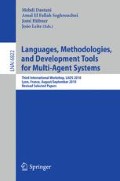Abstract
What happens when distributed sources of information (agents) hold and acquire information locally, and have to communicate with neighbouring agents in order to refine their hypothesis regarding the actual global state of this environment? This question occurs when it is not possible (e. g. for practical or privacy concerns) to collect observations and knowledge, and centrally compute the resulting theory. In this paper, we assume that agents are equipped with full clausal theories and individually face abductive tasks, in a globally consistent environment. We adopt a learner/critic approach. We present the Multi-agent Abductive Reasoning System (MARS), a protocol guaranteeing convergence to a situation “sufficiently” satisfying as far as consistency of the system is concerned. Abduction in a full clausal theory has however already a high computational cost in centralized settings, which can become much worse with arbitrary distributions. We thus discuss ways to use knowledge about each agent’s theory language to improve efficiency. We then present some first experimental results to assess the impact of those refinements.
Access this chapter
Tax calculation will be finalised at checkout
Purchases are for personal use only
Preview
Unable to display preview. Download preview PDF.
References
Adjiman, P., Chatalic, P., Goasdoué, F., Rousset, M.-C., Simon, L.: Distributed reasoning in a peer-to-peer setting: Application to the semantic web. J. Artif. Intell. Res (JAIR) 25, 269–314 (2006)
Alberti, M., Gavanelli, M., Lamma, E.: Runtime addition of integrity constraints in an abductive proof procedure. In: Hermenegildo, M.V., Schaub, T. (eds.) ICLP (Technical Communications), LIPIcs, vol. 7, pp. 4–13. Schloss Dagstuhl - Leibniz-Zentrum fuer Informatik (2010)
Amir, E., McIlraith, S.A.: Partition-based logical reasoning for first-order and propositional theories. AI 162(1-2), 49–88 (2005)
Bourgne, G., Hette, G., Maudet, N., Pinson, S.: Hypotheses refinement under topological communication constraints. In: AAMAS, IFAAMAS, p. 239 (2007)
Bourgne, G., Inoue, K., Maudet, N.: Abduction of distributed theories through local interactions. In: Proc. of the 19th European Conference on Artificial Intelligence, ECAI 2010 (August 2010)
Ciampolini, A., Lamma, E., Mello, P., Toni, F., Torroni, P.: Cooperation and competition in ALIAS: a logic framework for agents that negotiate. Annals of Math. and AI 37(1–2), 65–91 (2003)
Inoue, K.: Linear resolution for consequence finding. Artif. Intell. 56(2-3), 301–353 (1992)
Inoue, K., Sato, T., Ishihata, M., Kameya, Y., Nabeshima, H.: Evaluating abductive hypotheses using an em algorithm on bdds. In: Proc. of IJCAI 2009, pp. 810–815 (2009)
Kakas, A.C., Kowalski, R.A., Toni, F.: The role of abduction in logic programming. In: Handbook of Logic in Artificial Intel. and Logic Progr., vol. 5, pp. 234–324. Oxford Univ. Press, Oxford (1998)
Kakas, A.C., Mancarella, P.: Database updates through abduction. In: Proc. of VLDB 1990, pp. 650–661. Morgan Kaufmann Pub., San Francisco (1990)
Letz, R., Mayr, K., Goller, C.: Controlled integration of the cut rule into connection tableau calculi. JAR 13, 297–338 (1994)
Ma, J., Russo, A., Broda, K., Clark, K.: DARE: a system for distributed abductive reasoning. JAAMAS 16-3, 271–297 (2008)
Muggleton, S.: Inverse entailment and progol. New Generation Comput. 13(3&4), 245–286 (1995)
Nabeshima, H., Iwanuma, K., Inoue, K.: Solar: A consequence finding system for advanced reasoning. Autom. Reas. with Analytic Tableaux and Rel. Meth., 257–263 (2003)
Odell, J.J., Van Dyke Parunak, H., Bauer, B.: Representing agent interaction protocols in UML. In: Ciancarini, P., Wooldridge, M.J. (eds.) AOSE 2000. LNCS, vol. 1957, pp. 121–140. Springer, Heidelberg (2001)
Author information
Authors and Affiliations
Editor information
Editors and Affiliations
Rights and permissions
Copyright information
© 2011 Springer-Verlag Berlin Heidelberg
About this paper
Cite this paper
Bourgne, G., Inoue, K., Maudet, N. (2011). Towards Efficient Multi-agent Abduction Protocols. In: Dastani, M., El Fallah Seghrouchni, A., Hübner, J., Leite, J. (eds) Languages, Methodologies, and Development Tools for Multi-Agent Systems. LADS 2010. Lecture Notes in Computer Science(), vol 6822. Springer, Berlin, Heidelberg. https://doi.org/10.1007/978-3-642-22723-3_2
Download citation
DOI: https://doi.org/10.1007/978-3-642-22723-3_2
Publisher Name: Springer, Berlin, Heidelberg
Print ISBN: 978-3-642-22722-6
Online ISBN: 978-3-642-22723-3
eBook Packages: Computer ScienceComputer Science (R0)

